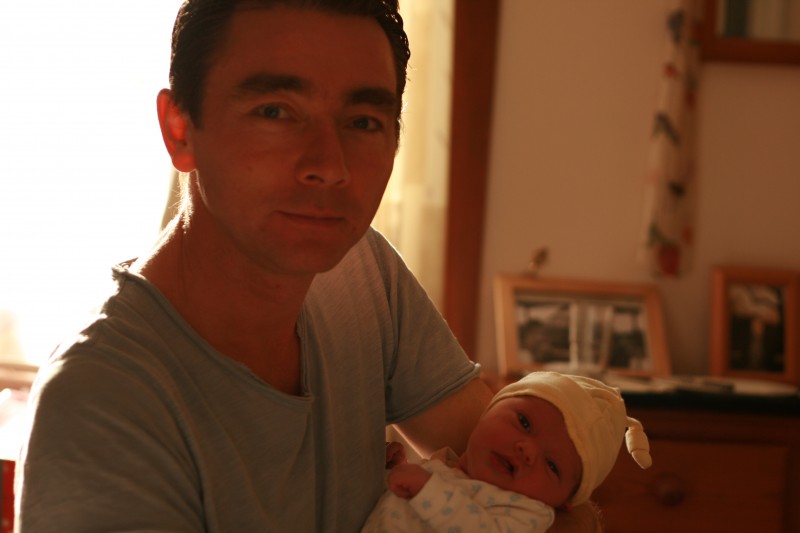Whereas Karl Marx described religion as the opium of the people, meaning that it provided an escape from the harsh realities of life, it’s been observed that, going by the manic conflicts in the Middle East, religion today looks more like the amphetamine of the people. (Tobias Stanislas Haller)
At this point, I have to tell you my own little amphetamine (speed)-related anecdote… and I promise I’ll get back to the point of the above remark about religion and amphetamine in a bit.
It’s 1985 and I’m hitch-hiking across the southern United States, in the cab of the fanciest, fastest, flashiest truck I ever got a ride in. Compliments from other truck drivers on the road were coming over on the CB radio, on this guy’s truck and its speed.

(This is probably not a very accurate picture of the truck in question because this story took place nearly 30 years ago, but you get the idea).
We were just outside Albuquerque, going 80-100 mph on the 55mph freeway through night-time New Mexico, when the ‘bird-dog’ (radar detector) on the dash started bleeping, alerting us to a police speed trap. Unfortunately, the truck was too fast for the radar detector, and almost as soon as it started bleeping, we could see the police car up ahead.
We got pulled over; the driver was given an on-the-spot fine. The police also searched the cab for drugs and found nothing, but confiscated the guy’s marijuana paraphernalia. What they failed to spot, on the cab floor, was the amphetamine tablets stashed in a screwed-up cigarette packet – of which we’d both already partaken.
At the time, I thought it was hilarious that the police had done the driver for speeding but we’d got away with ‘speeding’ in the other sense!
Now, I’m not promoting drug use and it’s 25 years since I last took any illegal substances, but it still raises a chuckle in my head when I think back to some of my pre-Christian escapades.
And, although those days are long behind me, I admit that I do have an addiction to speed. Not amphetamine, but the speed of a fast-paced life.
In fact, I had a bit of a wake-up call to my overactive lifestyle recently on a speed awareness course.
Yes, this year I was caught speeding myself.
Not 30-40mph above the limit like that truck driver. I was doing 36mph on a 30mph road through a rural village on the A21.
Like many people, I opted for the speed awareness course rather than points on my licence. The course was actually very good. In fact, I’d even say I enjoyed it!
At one point, one of the driving instructors who delivered the course asked, “Why do people speed?”
Answers from the floor varied between a range of circumstances, poor time management, the pace of life and pure impatience.
My answer was “Personality. A tendency to live fast, always wanting to do everything as quickly as possible, to pack as much into the time as possible.”
As I spoke the words out loud about myself, I had a sudden realisation that I needed to change – that I could change.
My addiction isn’t just to being busy. It’s an addiction to productiveness. This sense that every moment I have to be doing something useful – springing perhaps from a kind of insecurity, of feeling that I need to prove myself (to me; to God; to others?), and maybe stems from that sense of pre-Christian-conversion shame that leaves its mark even after years of experiencing the deep, liberating grace of God.
At work, I’m mostly my own boss. I manage my time autonomously, with no one watching over me. But rather than slacking, I have a tendency to try to pack in as much productive activity into the day as possible.
I’ve been told that I’m obsessed with multitasking!
I don’t take a lunch break, as such; I eat while I work, so that I can take time later in the day to run or write my blog. Not a second wasted.
And when I run, I aim to be as fast as possible.
Although I tend to drive carefully in residential areas (despite being caught inadvertently speeding in a 30mph zone), when it comes to longer-distance motorway driving, I try to get from A to B as fast as possible with little regard for speed limits.
It’s not an altogether healthy way of being.
My self-disclosure on the speed awareness course woke me up to this deeper problem behind my fast driving habits.
Returning to the opening reference to religion and amphetamine….it’s easy to see a certain ‘evil’ hyperactive religion in the guise of ISIS, for example.
But there’s also a kind of overactive religious ‘do-good-ing’. It may initially spring from the joy of being born again and being thankful to God for being forgiven and redeemed, but can become a self-motivated over-busy-ness in our own strength, with mixed motives, unhealthy attitudes, and carries the risk of burning out.
Sometimes we mistakenly try to pay God back. Something he never asks us to do.
Around the same time as the speed awareness course, I started to explore Christian contemplation or meditation: a slightly different approach to my faith than the styles of prayer that I’ve been used to, and quite an ambitious aim for a hyperactive do-er like me…
Contemplative traditions speak of ‘centring prayer’ and ‘living out of the centre’. I’m not even entirely sure what that means yet, but for me now, it involves my prayer life re-focussing on my identity in Christ, re-discovering what it means to just ‘be’, so that my praying, my actions, my life, start to flow once more from belonging unconditionally to God.
I’m re-discovering what it means to rest in God, and to act from a place of deeper security as his child – loved and accepted without having to do anything.
The benefits of this practice seem to be (subtly) evident already, in such a short time. They’re pretty personal, but here are a few broad hints:
- I’m feeling more confident to be me – less concerned with what others think of me;
- Genuinely letting go and trusting God with a recent difficult situation has been such a beautiful reality, that spontaneous laughter of trust has sprung from my lungs;
- “It is what it is” – that statement of contented acceptance of circumstances – resonates in my heart;
- Temptations seem to have less of a pull;
- Spontaneous words of genuine kindness have flowed more readily from these lips;
- And well-worn scriptures like these are taking on a fresh reality for me:
“But those who wait on the Lord shall renew their strength; They shall rise up with wings like eagles, They shall run and not be weary, They shall walk and not faint.” (Isaiah)
“Be still and know that I am God.” (Psalms)
“I am the vine, you are the branches. He who abides in Me, and I in him, bears much fruit; for without Me you can do nothing.” (Jesus, Gospel of John)
I’m not suggesting that Christian contemplative prayer is a panacea for every spiritual ill. It may not be for everyone – not even for every Christian.
Just that this is good for me – just now.
And that it’s another way of drawing on all those incredible resources available to us through the life and cross of Jesus.
And that many of us need to slow down and rest in God, for our own spiritual, mental and even physical health.
In fact, one of the most important changes for me is that I’m learning to slow down – just a bit:
to do less activity,
with more love,
as Mother Teresa so aptly said:

I can’t compare my faith to amphetamine or opium or any other drug, because central to faith in Jesus is acceptance of perfect Love, which is always free, pure and unsullied, and has no potential for addiction, as I explained in ‘Addicted to Love?’.
But I’ve started on my road to recovery from my addiction to the speed of life.
And if you bump into me at a meeting, I might just introduce myself like this: “I’m Roger, and I’m a recovering speed freak.”
 A time of stripping back,
A time of stripping back,













